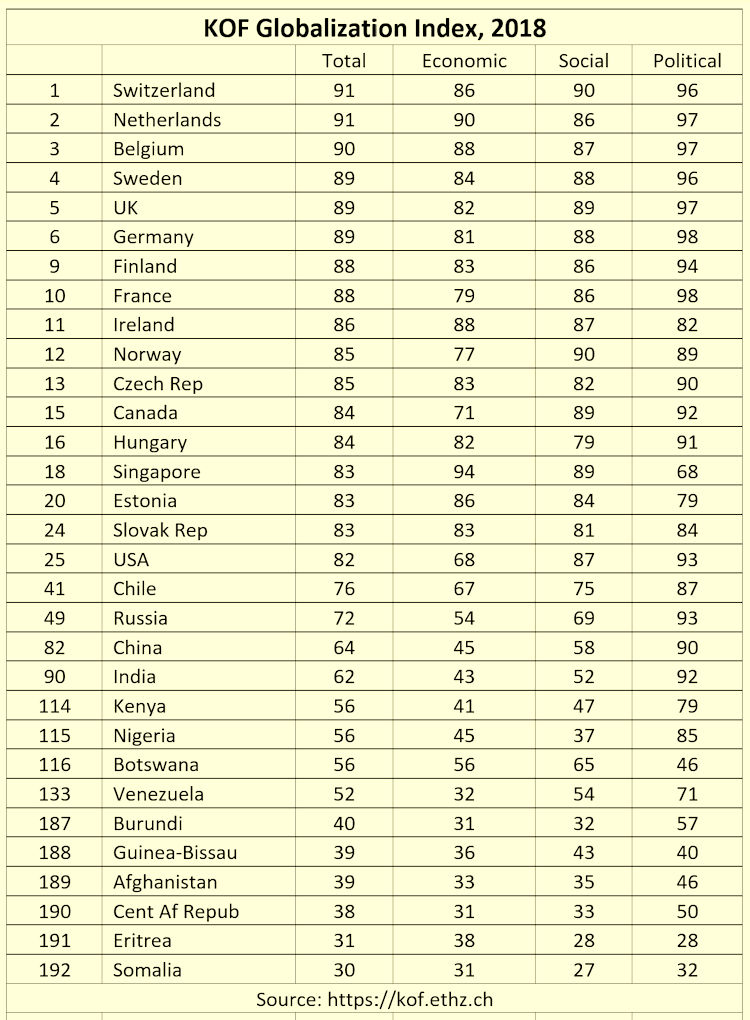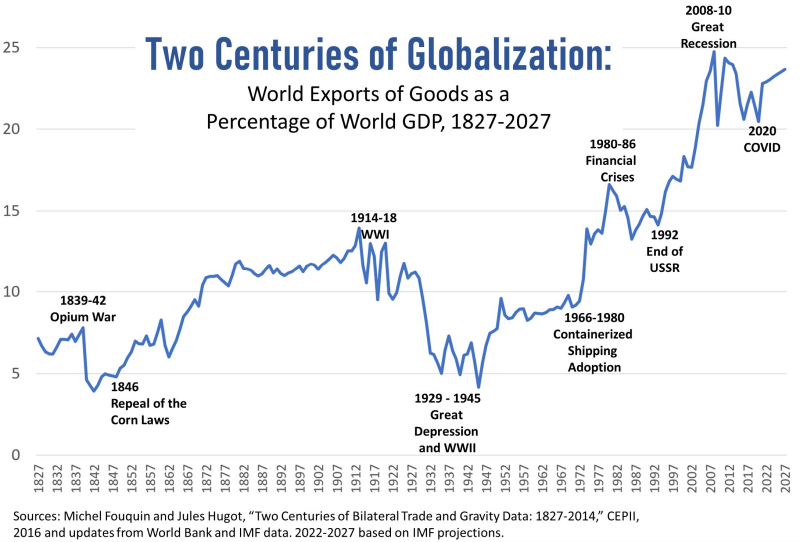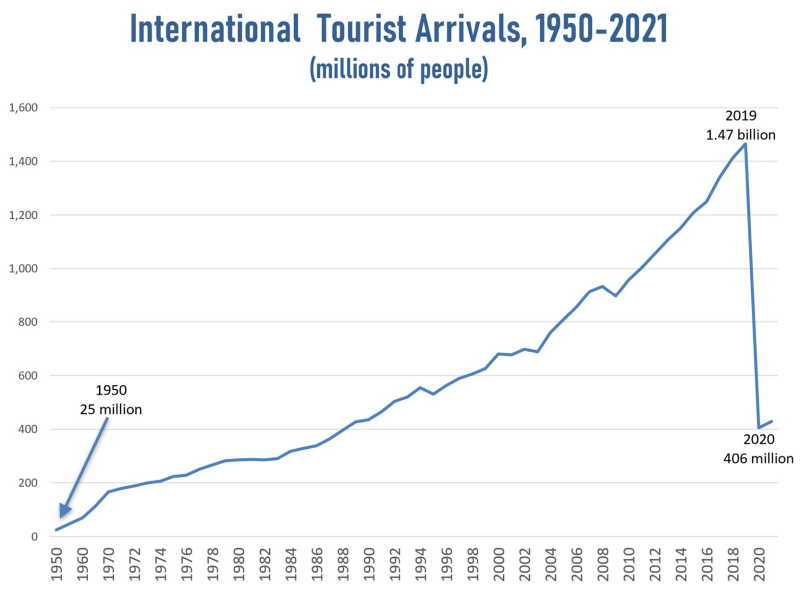|
History and Theories of Capitalism
I.
Preconditions
for historical development capitalist economic system
A.
Culture, religion, laws
- reduce tribalism (broaden trust, cooperation, and exchange),
protect ownership, allow accumulation of wealth.
B.
Sufficient labor productivity
- allows formation of an investable surplus.
C.
Individual freedom, safe travel
- allows exchange goods, change jobs.
D.
Monetary and accounting systems
- encourage trade.
II.
Precapitalist
Developments
A.
Egypt and Mesopotamia -
State ownership. Limited freedom.
B.
Greece and Rome -
Increased freedom, but slavery still dominant. Retail trade
primarily in luxuries for the upper class. Surplus was
used for public projects.
C.
The Middle Ages - The
countryside was segmented into self-sufficient feudal
estates. Systems of mutual obligations arose between
lords and servants and between the craftsmen in the cities. Recent
work by Croix, Doepke, and Mokyr emphasizes the
importance of the medieval craft guilds in the rise of
technology and productivity that led to capitalism in Europe.
Charles
Kupchan argues that "Europe's stunning rise was the
product of its own weakness" and its geographic position.
Political power was fragmented during the Holy Roman Empire,
allowing the rise of a business class in the cities, and
access to rivers and the Atlantic facilitated trade. Even more
recent work by Joseph Henrich (see his 2020 book, The
WEIRDEST People in the World) suggests that the
Catholic church ban on marriage to siblings and cousins
reduced tribalism and placed them on a path toward becoming
WEIRD (Western educated, industrialized, rich and democratic)
societies (see
this article for summary). The following passage and
table from Henrich's book demonstrates the contrast between
these cultural traits and earlier societies. By the way, in
China, he says that marriage among close relatives was first
made illegal by the Marriage Law of 1950 by the new Communist
government.
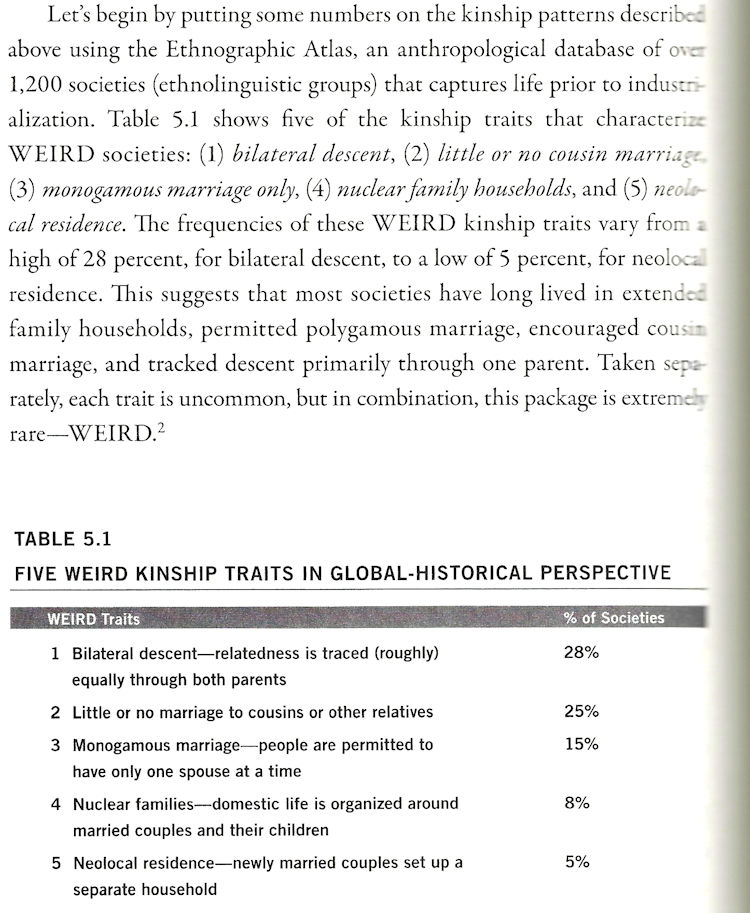
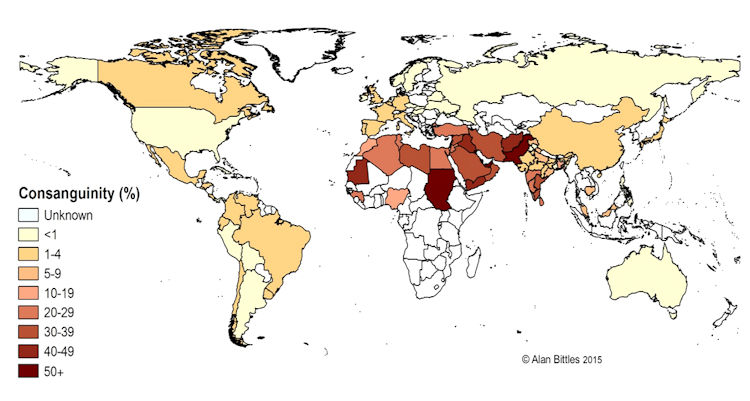
III.
The
Development of Capitalism
A.
Merchant Capitalism- 13th
C. in Italy. Also, enclosure movement
created wage dependent class.
B.
Renaissance - 15th C. -
Revitalization of literature and art; groundwork for
Industrial Revolution.
C.
Protestant Reformation -
16th C. - Weakened old power structure, created
individualistic theology. Max Weber (1864-1920), in The
Protestant Ethic and the Spirit of Capitalism (1905)
emphasized the role of Calvinist ideas in the 17th century
about work, saving, and accumulation of wealth. In his new
book, Religion and the Rise of Capitalism (2021),
Benjamin Friedman argues that a new and more "optimistic"
phase of the Reformation in the 18th century, rejecting
Calvinist beliefs about depravity and predestination, made it
possible for Adam Smith and other Enlightenment authors to
argue that free and self-interested behavior by individuals
could lead to positive social results. See this
article, this
podcast, and/or this
video.
D.
Putting out system -
16-17th C. - capitalist production in homes for a piece wage.
E. Treaty of Westphalia - 1648 -
Settlement at the end of the Thirty Years War, according to
Richard Haass and others gave "rise to the modern
international system" with respect for national sovereignty.
The data, assembled by Steven Pinker in The
Better Angels of our Nature, documents in the
reduction in international violence that followed (his image
from his book below).
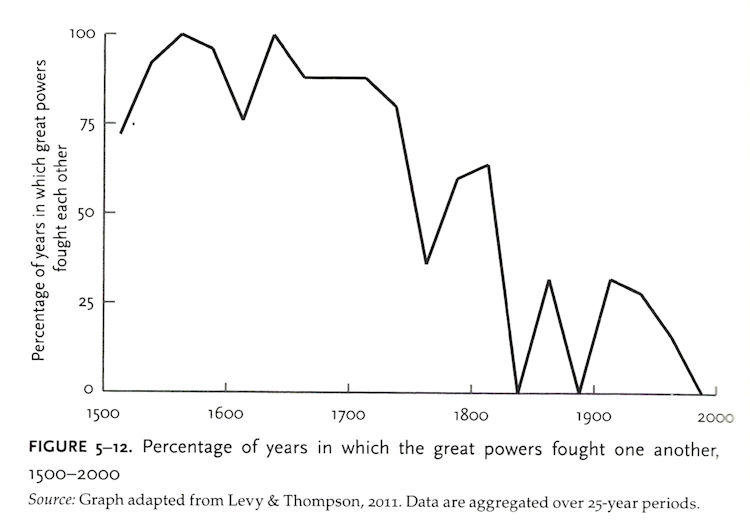
F.
Industrial Revolution -
17-18th C. - First in England and then spreading to other
countries. Supported by inventions such as coke smelting,
thread spinning, steam engine. Factory system. Rapid
capital formation and growth, becoming self sustaining.
G.
Mercantilists - Argued the
nation's stock of gold determined its wealth and power.
Favored strong national governments and intervention.
Imports heavily taxed and exports subsidized. Revenues from
sale of patents of monopoly, including international
trade.
IV.
Classical
Economics
A.
Adam Smith (1723-1790) -
Provision of consumer goods is
the ultimate purpose of production. A system based on self interest would best fulfill
social ends. A competitive
system would protect the consumer and would establish itself
with little government aid. The government
would have three important functions: to provide national
defense, administer justice, and to build public works.
B.
Jean-Baptiste Say
(1767-1832) - Demand for commodities does not depend on the
supply of money, but on the production of other
commodities. "Supply creates its own demand."
Government should encourage production and free market.
Foundation of supply side economics. Seemed to suggest that
there are no limits to economic growth, because demand is
elastic. But now running into environmental limits on the
supply side.
C.
Thomas Malthus
(1766-1834) - Doubted reliability of market system to generate
sufficient demand. Argued that population growth would
outstrip food production. Probable fate of mankind was war,
famine, and plague. Social welfare programs only make
the problem worse.
D.
David Ricardo
(1772-1823) - Accepted Say's Law. Main problem of
capitalism was income distribution. Population growth
would drive up food prices. Real wages at the
subsistence level, but money wages increase, causing profits
to fall. Investment would slow and economic growth would
stop (which seemed to be an OBVIOUS problem).
England could prevent this with a policy of free international
trade. Developed the concept of comparative advantage.
Each party produces according to low opportunity costs - what
they are "more better" or "less worse" at producing.
E.
John Stuart Mill
(1806-1873) - Believed that social justice was the most
serious problem of capitalism. For taxation of large
inheritances, redistribution of income, public provision of
education and health. On economic growth:
It
must always have been seen, more or less distinctly, by
political economists, that the increase of wealth is not
boundless: that at the end of what they term the progressive
state lies the stationary state, that all progress in wealth
is but a postponement of this, and that each step in advance
is an approach to it. . .
I cannot, therefore, regard the stationary state of capital
and wealth with the unaffected aversion so generally
manifested towards it by political economists of the old
school. I am inclined to believe that it would be, on the
whole, a very considerable improvement on our present
condition... It is only in the
backward countries of the world that increased production is
still an important object: in those most advanced, what is
economically needed is a better distribution, of which one
indispensable means is a stricter restraint on
population.
It is scarcely necessary to remark that a
stationary condition of capital and population implies no
stationary state of human improvement. There would be
as much scope as ever for all kinds of mental culture, and
moral and social progress... Hitherto
it is questionable if all the mechanical inventions yet made
have lightened the day's toil of any human being.
This sounds VERY much like a podcast
I heard this week (Feb 2023) with the environmental
economist, Kate Raworth, titled, "Is Economic Growth the Wrong
Goal?"
V.
Revolution
and
Intervention
A.
Karl Marx (1818-1883) -
According to historical materialism,
society adopts system appropriate for its level of
development. Capitalism regarded a necessary
evil for eventual adoption of socialism.
Problem of capitalism was desire for accumulation of
wealth. Exploitation of labor and investment in
machinery would lead to over-production, business depressions,
declining profits, social unrest, revolution.
B.
J. M. Keynes
(1883-1946)- Advocated reforms of capitalism during the Great
Depression. Rejected Say's Law and felt that the
government should bolster insufficient demand. Public
control of aggregate demand could be assumed slowly without
disturbing society. Allocation of resources and
distribution of goods should be handled by the private sector.
VI.
Austrians
A.
Joseph Schumpeter (1883-1950) - Critic of
Keynes. Creative destruction is strength and ultimate weakness
of capitalism
B.
Friedrich Hayek (1899-1992) - Danger of
macromanagement, informational efficiency of capitalism
VII.
Global
Capitalism
A.
Dimensions - Trade, Investment, Finance,
Information, Travel, Cultural Exchange, Intergovernmental
Cooperation
Many of these dimensions are reflected in the KOF
Globalization Index, prepared by a group of economists at the
Swiss KOF Economic Institute.
Web
site - map with interactive time lines.
Components
B.
Stages (Thomas Friedman, The World Is Flat, first
published in 2005)
1.0
(1492-1800) About “countries and muscles,” driven by
technology.
2.0
(1800-2000) Driven by continuing technological growth and
multinational corporations.
3.0
(2000-present) Driven by technologies favoring the individual
C.
Triple Convergence (Friedman)
1.
Technologies
(web-based
collaboration)
2.
Business
practices
(less top-down)
3.
Open
borders
(end of Cold War)
D.
Globalism Good? Adam Smith, David Ricardo, and
other classical authors argued for free trade in commodities,
which generally is mutually beneficial to countries. They said
little about free movement of labor and capital, which may be
beneficial to individual people, but may not benefit their
countries.
E.
Framework - Many of the global institutions
(IMF, World Bank, EU, etc) were created after WWII to rebuild
countries and to stabilize the Western world economy. In 1947,
President Truman visited Baylor University and gave
a speech on national radio, trying to convince Congress
to ratify U.S. involvement in an International Trade
Organization (ITO) with enforcement powers. He failed, so a
weaker General Agreement of Tariffs and Trade (GATT) was
established instead - and played a huge role in trade
liberalization.
Over time, the missions of the international institutions have
changed to: (1) provide support to developing countries, (2)
support market transitions of China and the former Soviet
client states, (3) bring more order to the growing complexity
of international trade and investment (GATT upgraded to
WTO in 1995). However, as the memberships of these
organizations have grown from around 20 countries to more than
160 and as the negotiations have grown more complex, it has
been more difficult to conclude broad agreements.
F.
Globalism vs Regionalism - Economists generally
prefer globalism (broad multilateral agreements) over
bilateralism and regionalism to gain the benefits of trade
creation (replacing inefficient domestic production with
trade, based on comparative advantages) without inefficient
and harmful trade diversion (replacing imports from
one country with imports from another after signing a
discriminatory trade agreement).
-- However, since the failure of the Doha Round, this has been
difficult, because (1) a larger and more diverse set of actors
in the global market since the end of the Cold War and rise of
China, and (2) the rise of populist movements in many
countries, stemming from rising intra-country inequalities,
growing immigrant/refugee populations the inflexibility of the
WTO, and slower global growth is leading to a new regionalism.
G.
Varieties of Global Capitalism
- Branko
Milanovich - Capitalism is triumphant, but with a
competition between "liberal meritocratic" capitalism in the
U.S., Europe, and several other countries, and "state-led"
capitalism in China, Russia, Singapore, Vietnam, and several
others. Liberal meritocratic has the advantages of democracy
and rule of law, but with rising inequality. State-led has
delivered high growth in China and elsewhere, but with
corruption, weak rule of law, and restricted freedoms.
H.
Global Corporate Responsibility Under
Capitalism - In 1962, Milton Friedman declared
that the “one and only one ‘social responsibility’ of
business” is to “increase profits.” Contrast with the Sullivan
Principles in the 1970s/1980s and the Business
Roundtable declaration in 2019. In 2021, Klaus Schwab,
the founder of the World Economic Forum, published Stakeholder
Capitalism: A Global Economy that Works for Progress,
People and Planet:
We
can’t continue with an economic system driven by selfish
values, such as short-term profit maximization, the
avoidance of tax and regulation, or the externalizing of
environmental harm,” Schwab writes. “Instead, we need a
society, economy, and international community that is
designed to care for all people and the entire planet.” Simon
Johnson argues that "until incentives created by
financial markets change, we should expect the short-term
profit motive to prevail," so the public sector is needed to
take externalities into account.
H. Changing
Global Public Opinion on Globalization - Back in 2003,
the Pew
Global Attitudes survey found "broad acceptance of the
increasing interconnectedness of the world. People generally
viewed growth of foreign trade, global communication and
international popular culture as good for them and their
families as well as their countries." Since that time, it
seems that attitudes toward globalization have been challenged
by:
* U.S. involvement in "never-ending wars" in the Middle
East
* Movement
of industrial jobs from high-income countries and rising
inequality
* Industrial job loss caused by technology, but
attributed to globalization
* Global "contagion" of the Great Recession of 2007-2009
*
Global pandemic and Ukraine wars, disruption of supply
chains, and questions of
dependency on potential adversaries.
* Crises in the Central America and North Africa
that sent refugees to U.S./Europe
* "America First" policy of the Trump administration
that caused other countries to
question a U.S.-led Western world.
* Questions in some countries about whether the Chinese
"One Belt, One Road"
investments were causing them to lose sovereignty.
By 2014, another
Pew poll showed that people in nearly all countries
still believed that international trade is "good," but it had
stronger support in developing countries than in the U.S. or
Europe, particularly in terms of creating jobs and raising
wages. Hence, the move to the British Brexit vote and the U.S.
Trump era caused many to question whether globalization was in
decline, and those questions have reached new height in the
aftermath of COVID-19. How will the pandemic affect
longer-term attitudes toward globalization? You
can make the case in either direction. Perhaps attitudes
AGAINST globalization will harden because:
* Reputations of the two major nations - China
and the
U.S. - have both been damaged.
* Perception that we have become too dependent on other
countries for essential items - PPE, antibiotics, etc.
On the other hand, the pandemic also shows the NECESSITY of
global cooperation, because so many of the world's problems -
epidemiology, development and production of new vaccines,
climate change, immigration, economic stability - require
global solutions. Another
Pew poll in advanced countries in 2020 found strong
continuing support for the United Nations and the belief that
stronger cooperation could have reduced the impact of
COVID-19. In the U.S., it found that Democrats were far more
supportive of international cooperation than
Republicans. Still
another poll found that people in most countries welcome
foreign investment that leads to building new factories, but
not foreign purchases of domestic firms.
Most
recently, a 2021
IPSOS poll of 25 countries found the following:
- Majorities
in all countries believed that "expanding trade is a
good thing" with an average of 75%
- Clear
majorities believed that "overall globalization is good
for my country" in only 8 of the 25 countries. Strongest
agreement was in Malaysia, South Africa, Peru, and
Brazil. Weakest agreement in France, Russia,
Belgium, and Italy.
- Positive
views of globalization were down in every country (most
of all in Latin America) by an average of 10 points
between 2019 and 2021.
|



